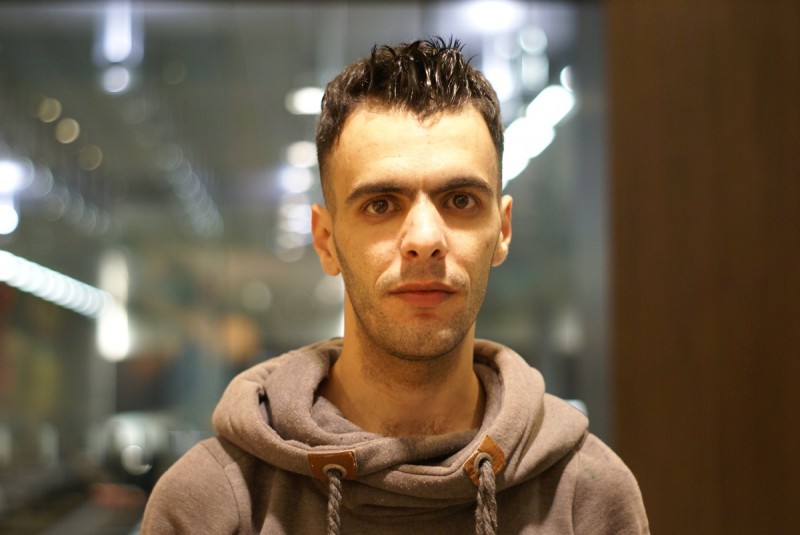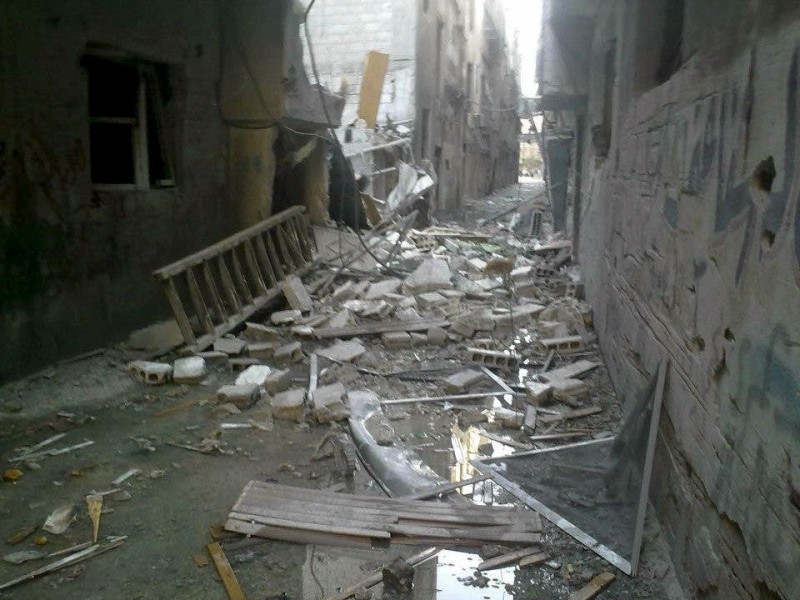
Ahmad Shihabi
A lot has been written about refugees in the last two years. But rarely do we hear from the refugees themselves in more than just soundbites. GlobalPost, an international news organization within the PRI family, commissioned essays from five young Syrians who all made the difficult decision to leave their homes — and undertake a menacing journey out of the country, to Turkey, to Greece and across southern Europe.
This essay by Ahmad Shihabi, 28, was originally published [1] on PRI.org on May 31, 2016, and is republished here with permission.
I am Palestinian Syrian. That means I am a refugee twice over.
My family first became refugees in 1948. They left Palestine to escape the violence and upheaval that took place during the creation of Israel. We call it the Nakba. Like many other Palestinians at the time, my family fled to Syria. They eventually settled in Yarmouk, an unofficial refugee camp south of Damascus.
That’s where I was born, in 1987. Yarmouk is like a city. It has schools and hospitals and other services all within about a one-mile area. It’s populated by both Palestinians and Syrians.
I finished my high school education in the camp’s school. While I was studying, when I was 16, I started my first job in my uncle’s publishing house as a typist. I worked there for six years. Then I moved to work in the journalism field with one of the Palestinian magazines that was based in the camp. I was an editor. I tried to collect some money to be able to reach university and complete my studies as a journalist. But it was too expensive. And once the Syrian crisis began, it was nearly impossible for me to even get to the university from where I lived in Yarmouk. My dreams were on hold.
The Syrian revolution started in March 2011. The pro-democracy protests eventually spread to Damascus, close to the Yarmouk camp. We as Palestinians supported the Syrian people. But at the same time, we didn’t like taking a public position against the Syrian regime. The government considers us guests, even though many of us have lived in Yarmouk our whole lives. So getting involved in the conflict could be dangerous for us. If we decided to take action, the whole camp would be under fire. So instead we worked to make our area a safe place for the Syrian people who were fleeing regime attacks on neighboring towns and cities.
We started bringing people into our homes, schools and hospitals. We gave them food, medicine and everything they needed. We received more than 200,000 people. We were refugees taking in refugees. And we succeeded for one year in keeping our area safe. Mostly. During this time, this first year of the conflict, we had some rockets and bombs fall on Yarmouk. Two of them struck near our house. At the beginning of 2012, my brothers and I decided to send my parents and little sisters to our relatives in Lebanon. It was the last time I saw them. After that the Lebanese government closed its borders to Palestinians.
“It was a scene that reminded all of us of the photos we had seen of the Palestinian Nakba in 1948.”
I call my family every day. I miss them every moment. They supported me in all of my choices in this life. I could never have imagined that we’d be separated like this. I last saw my sisters when they were 6 and 12 years old. They never got to complete their education. My father and brothers are working to secure a decent life for all of them in Lebanon. But it is hard. They don’t have a residency permit or work permits because they are Palestinians. Maybe someday I can visit them again.
It wasn’t long until the safety we tried to create in Yarmouk fell apart completely. On Dec. 17, 2012, everything changed. The camp was directly shelled by Syrian military planes. Then opposition fighters entered the camp, declaring that the area was now under their control. It was no longer safe for us civilians. Yarmouk had become a front line in the Syrian conflict.
The next day we watched as what seemed like a million people left their homes, carrying what they could, and walked out of Yarmouk. It was a scene that reminded all of us of the photos we had seen of the Palestinian Nakba in 1948. After three days on the road, many of us couldn’t find a safe place to sleep. So we went home. I returned to Yarmouk with about 50,000 other people. We stayed under partial siege for six months. We went out every day to find food and other basic supplies, crossing both regime and opposition checkpoints inside and outside the Yarmouk camp. It was terrifying. We walked beneath the eyes of snipers and were at their mercy. We couldn’t see them clearly but we felt their presence and witnessed their actions many times. They could finish our life whenever they wanted. But it was either risk getting killed by a gun or risk dying of hunger.
Finally, in June 2013, I left my house and the camp completely. I went to Damascus, where my girlfriend and I rented a flat. The flat was in the neighborhood of Qudsia, which was under opposition control. But they had a truce so it was safer. It was still hard to live though. We worked at the same magazine. Both of us got $175 per month. Our flat’s rent alone was $200.
After struggling to get by there for about a year, a friend of mine came to me and asked if I wanted to leave the country. I told him that it was impossible for me because I was Palestinian. I wouldn’t be allowed into either Lebanon or Jordan. As Palestinian refugees in Syria, we don’t have formal papers and so are not recognized by other countries. This makes it difficult to move around. He then suggested Turkey. But Turkey was far and you’d have to cross through a lot of dangerous parts of the country. I asked him how we’d do it. “Illegally,” he told me. “I have a smuggler. He will take us to the Turkish border.”
“I had never experienced things like this, terrorists and military operations, weapons in the streets. Before, the children had gone to school. Syrians are simple people, not extremists. They accepted each other without consideration of race or religion or even nationality. Now I can see that Syria is truly destroyed.”
It was very hard to decide if I wanted to leave this country without coming back again. I was born here. I studied here. I worked here. Even if it’s dangerous, it is my country. I like this country. My first steps in this life were on this land. And, most important for me, Syria — especially the Yarmouk camp — is my strongest connection to Palestine.
I told my girlfriend about the idea. At first she didn’t accept it because the Syrian north was under the control of ISIS and it seemed impossible to pass through checkpoints without being caught. That’s what we had heard on the news. I told her there was a smuggler and I got assurances that everything would be under control.
“If you want to go, I will be with you,” she said. It scared me to risk her life as well as mine. She is a Christian and if she was discovered by ISIS they might kill us. We agonized over the decision for two months. Finally, we decided that we would leave Syria illegally. The smuggler told us that we’d leave on the first of September. He said my girlfriend had to wear a hijab and that we also had to hide our phones and memory cards. All we could take with us was some clothes.
The smuggler gave us a plan for the journey. We would drive from Damascus to Manbij, which is halfway between Aleppo and Raqqa. Raqqa is where ISIS is based. From Manbij, we would walk over the border and into Turkey.

The street Ahmad Shihabi left in Yarmouk, Syria. The area had been damaged by airstrikes and fighting between the regime and rebels. Photo by Ahmad Shihabi
At 7 a.m. on Sept. 1, 2014, we left. We did not know if we would ever see home again. We drove for more than 13 hours with seven other friends and more than 50 people who lived in Manbij and were going home. They didn’t know anything about who we were or where we were going. The smuggler was the driver. We passed 47 regime checkpoints. Everything was under the control of the smuggler. He took our ID cards and our money. We paid more than $50 per person so the smuggler could bribe his way through the checkpoints. I think the other people knew that we were trying to leave the country. They could tell we were Palestinians. And no Palestinians live in Manbij. But they didn’t say anything.
While we drove, passing through checkpoints, we saw the massive scale of destruction across the country. We drove through many places, including Homs and Hama. I was shocked by the devastation. Why? Is this just for power? Or the price of freedom? Anyone can say what they want but we have one result: Our country is destroyed. After we passed all the regime’s checkpoints, the driver warned us that we had entered ISIS territory. After about a mile, we arrived at another checkpoint. Everyone was nervous. ISIS doesn’t allow women to sit near men, so all the women backed up and sat down at the end of the bus. I saw one soldier who looked very young. His gun was taller than him. He just checked the men’s ID cards and then told us we could go.
“Every step I took it seemed like I was losing one of my memories of this country. Every step I took I felt I was failing my friends, my family, my home at Yarmouk.”
We were very lucky that nothing more happened. And we were relieved because we didn’t expect any more checkpoints. But I was also shocked. How can they let a child hold a gun and give him the power to kill people? I had never experienced things like this, terrorists and military operations, weapons in the streets. Before, the children had gone to school. Syrians are simple people, not extremists. They accepted each other without consideration of race or religion or even nationality. Now I can see that Syria is truly destroyed.
We arrived at Manbij at 8 p.m. the same day. The smuggler took us to another smuggler. He told him that we were going to Turkey. We followed this new smuggler to his car. He drove us to the Turkish border. He told us, don’t be afraid. All we have to do is walk a mile, through the darkness. He told us that we couldn’t use any small light, no phone, nothing — or the Turkish police would see us. They were watching.
So we walked. We walked for one hour. Every step I took it seemed like I was losing one of my memories of this country. Every step I took I felt I was failing my friends, my family, my home at Yarmouk. Then I heard someone whisper, “It’s Turkey.”
Ahmad received his residency visa, which will allow him to stay in Germany for at least three years, a couple weeks ago. He is now living in Greiz, a small town of about 20,000 people in eastern Germany, not far from the Czech Republic. He plans to move to Berlin.